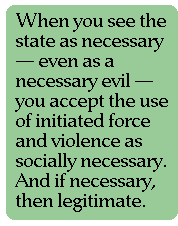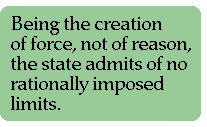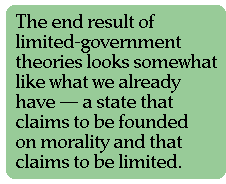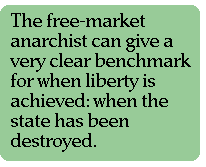www.thornwalker.com/ditch/ut007.htm
That truth should be silent I had almost
forgot.
— Antony and
Cleopatra, Act 1, Scene 2
Unsilent
Truth
May 14,
2002
The
benchmark
By RONALD N. NEFF
Last week I attended a gathering at which Nathaniel
Branden spoke on the difficulties of bringing people to
see the merits and requirements of political liberty.
At the end of the question-and-answer period, he
expressed his doubt that libertarians would ever
achieve their full vision of a free society, which in his
view includes and requires the existence of a limited
government. The reason he gave was this: once
libertarians have achieved 70 percent of what they
want, things will be so wonderful and citizens so
prosperous that no one will have the energy to work
for the other 30 percent; there will be so little need
for it that it just won't get done.
Jacob Hornberger — whose Future of Freedom
Foundation sponsored the event — closed the
evening by remarking that the benchmark he has in
mind is the closing of the IRS by the last IRS
employee, who locks the doors to the empty office
building and walks down a street crowded with
cheering libertarians.
And on many occasions I have heard another champion
of liberty (who was not at the FFF event) say that if
only we could get back to the Constitution, as far as
he was concerned, "You can keep the change."
In short, all three of these men, who have spent their
lives defending  the life of liberty against the
assertions and incursions of tyranny, have said that
they would be willing to settle for something less
than full political liberty. Certainly none of them
would object if a higher level of liberty were attained
— who would? — but each of them
describes a point short of complete liberty at which
he would be satisfied. Since none of them is a policy
wonk — we expect policy wonks to sell out
liberty and make compromises all the time —
what is there about them that might explain why they
would be willing for some small measure of tyranny
to survive and continue in an otherwise largely free
society?
the life of liberty against the
assertions and incursions of tyranny, have said that
they would be willing to settle for something less
than full political liberty. Certainly none of them
would object if a higher level of liberty were attained
— who would? — but each of them
describes a point short of complete liberty at which
he would be satisfied. Since none of them is a policy
wonk — we expect policy wonks to sell out
liberty and make compromises all the time —
what is there about them that might explain why they
would be willing for some small measure of tyranny
to survive and continue in an otherwise largely free
society?
The theme that unites them, I submit, is that they all
start out advocating or tolerating what they call a
limited government. All of them reject free-market
anarchism completely or are at least uneasy about it
and doubt its feasibility.
When you see the state (or "government" as they
prefer to call it) as necessary — even as a
necessary evil — you perforce accept
the use of initiated force and violence as socially
necessary. And if necessary, then legitimate. These
writers would all deny that government represents an
initiation of force, but not one of them can tell you
how a government could come into existence without
it. Not one of them can design or describe a
government that does not engage in inherently
criminal behavior. Not one of them can even imagine a
government that does not invade markets and create
special interests. They might all talk about such
governments, but that is not quite the same thing. It's
easy to talk about a perpetual-motion machine, quite
another to design one, and still another to build it.
Once having conceded the necessity of initiating force
in order to create the imaginary limited government,
an intellectual will be led by the logic of his position
to find similarly
acceptable whatever level of force is necessary to
maintain the existence of that state. That explains why so many supposed
libertarians — though not the ones I was
speaking of —  have found the War on Terrorism
unobjectionable: this limited government, this "freest
government that has ever existed" is thought to be
under attack and in danger. Therefore, some
violations of liberty are acceptable, perhaps
necessary, in order to defend it — and in that
case, they must say, those violations are justified,
moral, and virtuous. Just what they will accept
in the way of violations differs from one to another, but that is not the
point. The point is that, for them, it is necessary in
some circumstances to "do something," even when
there are no constitutional alternatives available for
the doing. What they imagine is that unless we
tolerate some infractions, liberty will be totally lost;
therefore we must tolerate the infractions and then
work to undo them later. We must suppose that
"later" means "some time at which liberty is not
under assault from outside."
have found the War on Terrorism
unobjectionable: this limited government, this "freest
government that has ever existed" is thought to be
under attack and in danger. Therefore, some
violations of liberty are acceptable, perhaps
necessary, in order to defend it — and in that
case, they must say, those violations are justified,
moral, and virtuous. Just what they will accept
in the way of violations differs from one to another, but that is not the
point. The point is that, for them, it is necessary in
some circumstances to "do something," even when
there are no constitutional alternatives available for
the doing. What they imagine is that unless we
tolerate some infractions, liberty will be totally lost;
therefore we must tolerate the infractions and then
work to undo them later. We must suppose that
"later" means "some time at which liberty is not
under assault from outside."
It is bad enough that liberty can always be thought to
be under assault from some outside force, but even
worse is that there is no objective standard by which
one can determine how much infraction of liberty is
acceptable, even after all our enemies have been
subdued; there is no objective standard by which one
can determine how limited or how unlimited the state
is supposed to be or to what extent liberty can be
compromised. Being the creation of force, not of
reason, the state admits of no rationally imposed
limits. Shall we be governed by many or few? in how
many groups? chosen how? how often? by whom?
May they count us or not? be paid to count us or not?
And every government official who ever speaks in
favor of a position for the government to take is a
man paid by the  citizenry to promote a view which we
may or may not share. Before he even opens his
mouth, some who disagree with him are nevertheless
paying for him to advance whatever he has in
mind.
citizenry to promote a view which we
may or may not share. Before he even opens his
mouth, some who disagree with him are nevertheless
paying for him to advance whatever he has in
mind.
Often, it feels as though free-market anarchists
— all seven or eight of us — and the
limited-state libertarians are fighting essentially the
same battle. If that is so, can we not wait until after we have dealt the final blows to tyranny to concern ourselves with
the details of whether there should be a state? One reason
it feels that way is that for the most part our
arguments against liberals, socialists, communists,
Republicans, fascists, monarchists, and conservatives
overlap. In terms of the inventory of activities that
we object to, there certainly seems to be a lot of
overlap.
But the overlap is in some measure superficial. The
reason that advocates of the limited state have
differing benchmarks for when we can declare
victory and go home is that the difference between
what we have and what they call for is, in the end, a
difference in degree. A big difference in degree, to be
sure, but a difference in degree nonetheless. There's a
difference in degree between desert heat and
comfortable sunbathing weather, and a difference in
the manner in which one survives in them. But both
can give you skin cancer. And there's no way of
telling in advance how dangerous the cancer will be or
how much exposure will give rise to it.
Moreover, the end result of limited-government
theories looks somewhat like what we already have
— a state that claims to be founded on
morality and that claims to be limited.
Limited-government libertarians recognize a fundamental
similarity between what their ideal is and what
something less than that ideal is. They do not confuse
the ideal with the nonideal, but in their benchmarks
they implicitly recognize the similarity.
 Because the limited state and the total state are on a
continuum, the limited state — even the limited
state of the Objectivists, who reject taxation as a
method of funding it — can fade gradually into a
socialist tyranny over the years. And it may take
enough years that those who are to be oppressed are
not those who founded the original state. The
transformation could take place over generations, and
it might even pass unnoticed for a while, for between
the two there is no discontinuity.
Because the limited state and the total state are on a
continuum, the limited state — even the limited
state of the Objectivists, who reject taxation as a
method of funding it — can fade gradually into a
socialist tyranny over the years. And it may take
enough years that those who are to be oppressed are
not those who founded the original state. The
transformation could take place over generations, and
it might even pass unnoticed for a while, for between
the two there is no discontinuity.
Free-market anarchists recognize no such
similarity; the existence and nonexistence of the state
are completely discontinuous states of affairs. They
are not on a continuum at all. Consequently, the
free-market anarchist can give a very clear benchmark for
when liberty is achieved: when the state has been
destroyed, when no man can make a claim of statish
authority over another without being laughed at by
some and stoned by others. A free-market anarchism
could not fade into tyranny over generations. Once an
attempt at forming a state were made, a fundamental
breach of liberty would be in the offing. There would
be no mistaking when the march to tyranny had
begun.
A limited state is just less tyrannical than the total
state; the stateless society is quite different. To stop
short of that goal is to concede that some level of
tyranny is tolerable, perhaps necessary, and finally
justified and moral.
© 2002 by WTM Enterprises. All
rights reserved.
If you found this article to be interesting, please donate to our cause. You should make your check or m.o. payable in U.S. dollars to WTM
Enterprises and send it to:
WTM Enterprises
P.O. Box 224
Roanoke, IN 46783
Thanks for helping to assure a future for TLD! Here's some info on what you'll get as a donor.
Notice to
visitors who came straight to this document from off site: You are deep in
The Last Ditch.
You should check out our home page
and table of
contents.
 the life of liberty against the
assertions and incursions of tyranny, have said that
they would be willing to settle for something less
than full political liberty. Certainly none of them
would object if a higher level of liberty were attained
— who would? — but each of them
describes a point short of complete liberty at which
he would be satisfied. Since none of them is a policy
wonk — we expect policy wonks to sell out
liberty and make compromises all the time —
what is there about them that might explain why they
would be willing for some small measure of tyranny
to survive and continue in an otherwise largely free
society?
the life of liberty against the
assertions and incursions of tyranny, have said that
they would be willing to settle for something less
than full political liberty. Certainly none of them
would object if a higher level of liberty were attained
— who would? — but each of them
describes a point short of complete liberty at which
he would be satisfied. Since none of them is a policy
wonk — we expect policy wonks to sell out
liberty and make compromises all the time —
what is there about them that might explain why they
would be willing for some small measure of tyranny
to survive and continue in an otherwise largely free
society? have found the War on Terrorism
unobjectionable: this limited government, this "freest
government that has ever existed" is thought to be
under attack and in danger. Therefore, some
violations of liberty are acceptable, perhaps
necessary, in order to defend it — and in that
case, they must say, those violations are justified,
moral, and virtuous. Just what they will accept
in the way of violations differs from one to another, but that is not the
point. The point is that, for them, it is necessary in
some circumstances to "do something," even when
there are no constitutional alternatives available for
the doing. What they imagine is that unless we
tolerate some infractions, liberty will be totally lost;
therefore we must tolerate the infractions and then
work to undo them later. We must suppose that
"later" means "some time at which liberty is not
under assault from outside."
have found the War on Terrorism
unobjectionable: this limited government, this "freest
government that has ever existed" is thought to be
under attack and in danger. Therefore, some
violations of liberty are acceptable, perhaps
necessary, in order to defend it — and in that
case, they must say, those violations are justified,
moral, and virtuous. Just what they will accept
in the way of violations differs from one to another, but that is not the
point. The point is that, for them, it is necessary in
some circumstances to "do something," even when
there are no constitutional alternatives available for
the doing. What they imagine is that unless we
tolerate some infractions, liberty will be totally lost;
therefore we must tolerate the infractions and then
work to undo them later. We must suppose that
"later" means "some time at which liberty is not
under assault from outside." citizenry to promote a view which we
may or may not share. Before he even opens his
mouth, some who disagree with him are nevertheless
paying for him to advance whatever he has in
mind.
citizenry to promote a view which we
may or may not share. Before he even opens his
mouth, some who disagree with him are nevertheless
paying for him to advance whatever he has in
mind. Because the limited state and the total state are on a
continuum, the limited state — even the limited
state of the Objectivists, who reject taxation as a
method of funding it — can fade gradually into a
socialist tyranny over the years. And it may take
enough years that those who are to be oppressed are
not those who founded the original state. The
transformation could take place over generations, and
it might even pass unnoticed for a while, for between
the two there is no discontinuity.
Because the limited state and the total state are on a
continuum, the limited state — even the limited
state of the Objectivists, who reject taxation as a
method of funding it — can fade gradually into a
socialist tyranny over the years. And it may take
enough years that those who are to be oppressed are
not those who founded the original state. The
transformation could take place over generations, and
it might even pass unnoticed for a while, for between
the two there is no discontinuity.